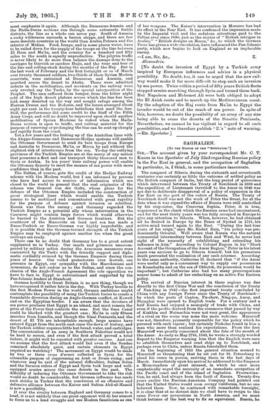L'ro THR EDITOR Or THE " SPECTATOR:I SIn,—The account given
by your correspondent Mr. C. , T. Knaus in the Spectator of July 22nd regarding Russian policy in the Far East in general, and the occupation of Saghalien in particular, is, I think, in some particulars inaccurate.
The conquest of Siberia during the sixteenth and seventeenth centuries was certainly as little the outcome of settled policy as the British conquest of India, but the long period of quiescence which intervened between the Treaty of Nerchinsk in 1689 and the expedition of Lieutenant Gavriloff to the Amur in 1846 was not due to deliberate disapproval of a policy of expansion in the Far East on the part of the rulers of Russia. The Treaty of Nerchinsk itself was not the work of Peter the Great, for at the date when it was signed the affairs of Russia were still controlled by his step-sister, the Czarevna Sophia. Peter, it is true, acquiesced in the check which the Russian arms had encountered, and for the next thirty years was too fully occupied in Europe to give any attention to Siberia. When, however, he had obtained all he desired in Europe by the Peace of Nystad in 1721, his active mind turned again to the East. "During the last four years of his reign," says Mr. Nisbet Bain, "his policy was pre- dominantly Oriental. Well aware that Russia was the natural commercial intermediary between East and West, he never lost sight of the necessity of establishing and extending his influence in Asia." According to Colonel Ragoza in his "Short Account of the Occupation of the Amur Region," Peter in his latest years was anxious to go to Siberia himself, but his premature death prevented the realisation of any such schemes. According to the same authority, Catherine II. declared that "if the Amur were useful only as a convenient way to supply our possessions in Kamchatka and on the sea of Okhotsk, its possession would be important"; but Catherine also had too many preoccupations nearer home to admit of her embarking on an active Far Eastern policy.
The revival of Russian interest in these regions was due directly to the first China War and the conclusion of the Treaty of Nan-king in 1842—the first important treaty concluded by China with any foreign Power since the Treaty of Nerchinsk- by which the ports of Canton, Fu-chow, Ning-po, Amoy, and Shanghai were opened to English trade. For a century and a half Russia had enjoyed a monopoly of trade with China, and even if the profits derived from the commerce that passed by way of Kiakhta and Maimachin were not very great, the appearance of a rival on the scene was none the more welcome. Muravieff was not, therefore, primarily responsible for the policy which he pursued with such vigour ; but certainly Nicholas found in him a man who more than realised his expectations. From the first Muravieff was greatly concerned about the fats of the mouth of the Amur. As early as May 27th, 1849, he wrote a strongly worded Report to the Emperor warning him that the English were sure to establish themselves and send ships up to Nerchinsk, and perhaps even to Chita, unless Russia forestalled them.
In the beginning of 1863 the general situation seemed to Muravieff so threatening that he set out for St. Petersburg to plead his cause in person, arriving there in the last days of March. Immediately upon his arrival he addressed to the Emperor a Memorandum of great interest, in which he once more emphatically urged the necessity of an immediate occupation of the Pacific coast and of the island of Saghalien. Procrastina- tion, he said, had always been the fault of Russia. Twenty-five years earlier the Russian-American Company had pointed out that the United States would soon occupy California, but no one believed them. Now, he continued with remarkable foresight, it is clear that at no distant date we shall have to resign to the same Power our possessions in North America, and we must think betimes of the best way to fix an equivalent. Russia, he
declared, must be mistress of the whole sea-board of Eastern Asia, but the sands were running out and the time that remained was short. "By force of circumstances," he went on, "we have been compelled to allow the English to penetrate into this part of the world, and this nation, to the great detriment and reproach of all Europe, now imposes its laws in all the quarters of the globe, except in America,—laws which tend by no means to the benefit of humanity but only to the satisfaction of Great Britain's commercial interests, while they disregard the peace and welfare of other peoples. The situation, however, may still be saved by a close union between Russia and the 'United States. England is straining every nerve to prevent the cementing of any such bond. Everywhere and by every means her agents are striving to separate America from Russia There is no doubt that an essential part of her programme is the possession of Saghalien and of the mouth of the Amur." The Memorandum concludes by an urgent appeal to Nicholas to authorise the immediate occupation of the island by the Russian- American Company. The Emperor was so much impressed by Muravieff's arguments that on April 23rd an Imperial decree was issued in the sense which the Governor-General desired. The occupation of the island was thus directly due to Russian fear of England. Armed with these instructions, Mnravieff hastened backed to Irkutsk, whence he forwarded despatches to Captain Nevelskoy, who was in command of the Amur Expedition. Within ten days' time, according to Muravieff's biographer, Nevelskoy had hoisted the Russian flag at Itinsk, on the coast of Saghalien.
—I am, Sir, &c., J. GORDON BROWNE.







































 Previous page
Previous page